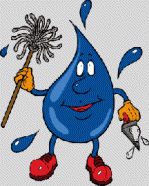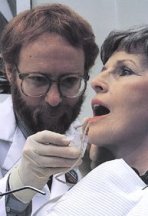Spit Power
Saliva provides clues about diseases, dental cavities, and who might have been at a crime scene.
By Emily Sohn
Mahvash Navazesh has dedicated 25 years of her life to the study of spit.
“My nickname is ‘Spit Queen,'” says Navazesh, who teaches at the University of Southern California School of Dentistry in Los Angeles. She can joke about her work, but she also wants you to know that spit, or saliva, is much more than the slimy stuff that you might use to wet a spitball.
“Most people take saliva for granted,” she says. “It’s one of the least-respected body fluids.”
 |
|
Saliva protects your teeth and helps you digest food. |
| Teethwise (http://www.teethwise.org/ ) |
Saliva actually deserves a lot of respect. To start with, it protects your teeth and allows you to talk and eat. Police investigators use the results of saliva tests to solve crimes and nab drunk drivers. Doctors are starting to use spit instead of blood to diagnose diseases and to test for pregnancy.
Analyzing saliva can be a lot like looking into a crystal ball. Navazesh, for example, is working on a project that uses saliva to determine a kid’s chances of developing dental cavities.
“Scientists are investing hours and hours of their lives to discover more about saliva,” she says. “It’s a fountain of opportunity.”
Like water
Most people treat saliva as if it were like water. It’s easy to understand why. Saliva is made up of more than 99 percent water.
But saliva also contains a variety of substances called proteins that give it unusual powers. Some of the proteins clean your teeth and gums by preventing bacteria from sticking to the surfaces. Others kill bacteria, viruses, and fungi.
 |
|
Cats take advantage of the antiseptic properties of saliva when they clean themselves with their tongues. |
It’s these cleansing and antiseptic properties of saliva proteins that explain why dogs lick their wounds and cats clean themselves with their tongues. Spit also contains special proteins known as enzymes, which help digest your food as you chew.
Scarce spit
In healthy people, three pairs of major salivary glands and many small ones produce a constant supply of spit. The average healthy mouth produces about 600 milliliters of saliva each day. That’s enough to fill a 12-ounce soda bottle.
Salivary glands can stop doing their jobs, however, when people have certain diseases, take some kinds of medicines, or go through treatment for cancer.
The most dramatic demonstrations of saliva’s importance come from people who don’t have enough. In an exhibit room at the National Museum of Dentistry in Baltimore, Md., a video screen shows people describing how hard life can be when spit is scarce.
“It seems to take over your whole being,” one woman says. “Your mind stays with your mouth. You can’t get satisfied.”
Another patient says that she sometimes wakes up in the middle of the night with her tongue stuck to the roof of her mouth because there’s no saliva to keep things moistened.
Imagine what it would be like to have a wad of peanut butter in your mouth all the time. That’s how it can feel if you don’t have enough saliva.
These patients have a hard time chewing and swallowing, Navazesh explains. They don’t enjoy the taste of food. They choke easily on crunchy items.
For patients such as these, scientists have developed medicines that push the salivary glands to work harder and produce more moisture.
Liquid information
Recent saliva research has revealed how rich in information the liquid is.
 |
|
Easy to collect and store, saliva contains a lot of information about a person’s health. |
| NIH |
For example, one promising role for saliva is in diagnosing disease. Doctors today draw blood to look for signs of disease based on the presence of various substances in the blood. It now turns out that saliva holds the same information.
Your spit also contains samples of the genetic material DNA. Everyone’s DNA is different. Analyzing DNA in a glob of spit can tell doctors whether you are susceptible to certain diseases. Such an analysis can also tell investigators whether you were the one who stopped to drink a glass of water or licked an envelope to seal it at the scene of a crime.
For doctors, the nice thing about spit is that it’s easy to get. No needles are necessary.
Predictive power
Navazesh and her coworkers are studying how proteins in saliva affect teeth. Their goal is to use information about what’s in spit to predict a person’s chance of getting cavities.
 |
|
Information about what’s in spit may predict a person’s chance of getting dental cavities. |
The project involves kids between 7 and 14 years old. All are checked once a year for new cavities. Using statistics to account for differences in diet and lifestyle, the researchers are trying to link a kid’s saliva proteins to the development of cavities.
The researchers hope to develop a test that will identify patients whose teeth need special care, such as sealing. Down the line, such treatments could prevent a lifetime of extra visits to the dentist and unpleasant dates with the drill.
As scientists unveil how helpful saliva can be, it might be time for you to think differently about your own.
“Look at your saliva as a friend rather than an enemy,” Navazesh says. “Love your saliva. Have respect for it. And take care of your teeth.”
Going Deeper:







